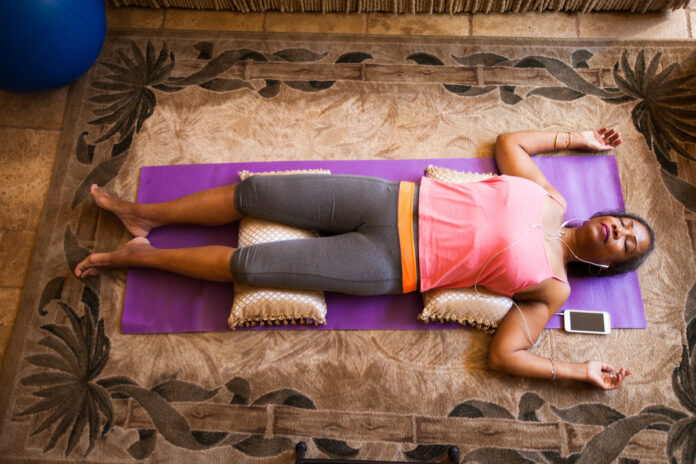
Getting great quality sleep every night has been proven to play an integral role in providing people with a platform to tackle whatever life throws at them the following day.
Sleep also contributes to our physical health and mental wellbeing, helping to lower the risk of suffering conditions such as diabetes, stroke, heart disease, depression and many more.
Generally speaking, adults should get an average of around seven to nine hours sleep per night throughout the year.
Establishing a relaxing pre-bedtime routine has been found to be the best way to ensure you get the requisite amount of sleep each night.
A recent study found that meditation is the top activity people can undertake, with participants spending an average of eight hours and four minutes asleep.

They spent only 12 minutes awake during the night – the lowest amount generated by any of the 14 different activities analysed.
One of the key elements provided by meditating is its ability to reduce worry and repetitive negative thoughts, which can significantly cut the risk of clinical depression.
Meditation teaches people to cope more effectively with stress, thus establishing a more positive mindset which is conducive to getting good quality sleep.
Cardiologist and certified mindfulness teacher Dr Jonathan Fisher is an advocate of meditation as a mechanism to ease anxiety and support other elements of health.
“Practicing mindfulness has been shown to enhance both our mental and physical wellbeing,” Dr Fisher said.

“Heart benefits have been reported as a result of reduced stress, including lower blood pressure, and improved ability to quit smoking, stop overeating, and use smokeless tobacco products such as Grinds, which are main important risk factors for cardiovascular disease.”
While meditating offers people numerous benefits, many individuals lack the confidence to partake in the practice for fear of getting it wrong.
The traditional position for meditation is sitting on a pillow or cushion on the floor with your legs crossed in front of you and your feet flat.
Your spine should be upright and your shoulders relaxed. The position is completed by placing your hands in your lap or on your thighs.
Some people prefer to lie down, particularly if they are using meditation as part of a structured pre-bedtime routine.
A common misconception about meditating is the trance-like state many people believe you must get into for the practice to be effective.

However, the primary aim of meditation is to clear your mind of stress, anxiety and negative thoughts by focusing on breathing.
Fisher says breathing slowly and exhaling gradually allows the mind to become still, which serves to establish the correct mindset for getting good quality sleep.
“There is no right way to meditate,” Fisher added. “Find a quiet, solitary space, where you are unlikely to be distracted.”
“Start slow – just one to five minutes daily – and work your way up gradually to 10 to 20 minutes daily, as you feel comfortable.
“Don’t have any expectations as to what you should experience. Just see how your mind flows, and notice how you feel.”
Dr Fisher’s views are supported by respected neuroscientist and best-selling author Matthew Walker, who has conducted extensive research into sleep.

During a recent ZOE Science And Nutrition podcast, the 49-year-old extolled the virtues of a meditation practice known as taking a ‘mental walk’.
He says this helps us to take our mind to a place it feels safe, thus aiding the process of getting to sleep and creating the right environment to enjoy restorative rest.
“Think about a walk you know really well,” he said. “Maybe it’s a walk in the woods or a hike or a walk on the beach, and then try to really visualise that.
“Focus to the point of thinking ‘this is me leaving my front door – I’m walking down the steps – off I go’.
“If you do it in granular detail, the next thing you’ll remember is your alarm going off the next morning because you’ve fallen asleep.”
The key to unlocking the power of a ‘mental walk’ is familiarity – choosing a walk you know and enjoy makes the process much easier.
The walk does not necessarily have to be local – it can be something you discovered during a short-break or on a fully-fledged vacation in a location you love.

Before embarking on your ‘mental walk’ it is imperative to mentally stand still, take some deep breaths and drink in your visualised surroundings.
Spend time thinking about the smells or the sounds around you – maybe you are on a beach with the waves lapping at your feat or in the countryside with birds singing gently.
If you find it difficult to imagine your surroundings in vivid depth, consider using additional tools before you embark on your ‘mental walk’.
This could involve looking at pictures of the area in question or talking with your partner about your experiences there before you start.
While walking along the same route every day may sound boring, this does not apply when you are linking it mentally to the sleep process.
By keeping to the same walk every night you may notice different things along the way, which helps to mix things up while keeping the brain relaxed.
The familiarity element is the key to the entire process and maintaining consistency in the ‘mental walk’ you undertake will help to deliver better sleep.

It may take a little time for this methodology to work, so give your mind the chance to become accustomed to the new routine and it will pay dividends.
Repetition will help your mind recognise that it is time for sleep, thus increasing your chances of getting the seven to nine hours rest you need to function effectively.
By incorporating a ‘mental walk’ into your pre-bedtime routine, you should soon be enjoying the quality of sleep required to support your physical health and mental wellbeing.



